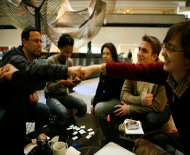Future Now
The IFTF Blog
Games aid preparation for the zombie apocalypse
Kids everywhere have a new excuse for playing games instead of doing their homework—it turns out the right games could improve their likelihood of surviving a natural disaster.
I sat down to talk with Jenny Gottstein, Director of Games and Senior Event Producer at The Go Game, about her disaster preparedness game. From hurricanes, to tsunamis, earthquakes, tornados, wildfires, floods, and superstorms, the next decade is expected to see a continued increase in the number of extreme weather events. Gottstein’s goal is to increase community resilience in the face of those events, through play.
“Games build muscle memory, and create interpersonal ties,” Gottstein said. “Quite literally, they bring people together. And studies have shown that building a strong social connection within your community can save lives in a crisis.”
At the Institute for the Future, we talk a lot about “gameful engagement” as an important strategy for companies, governments, and individuals to engage people in a more dynamic way than allowed for by traditional methods for education, advertising, or communications. This will be especially important with the cohort of “digital natives,” who are growing up with the expectation for immersive, interactive engagement.
Resilience is another theme that frequently appears in our Ten Year Forecasts. As we head into a volatile and uncertain decade, being able to adapt quickly and find steadiness amidst perturbation will be more important than ever before.
In 2010, IFTF partnered with the US Geological Survey (USGS) and Art Center College of Design to create After Shock— the first Massively Multiplayer Collaboration game focused on a natural disaster. This online simulation used game mechanics to teach disaster response skills and encourage collaboration between players. It created a platform for people across a wide range of geographies to form a sense of community and make a survival plan. Gottstein and her team at The Go Game take digital experiences like this to the next level by bringing them to life.
A few years ago, Gottstein started thinking about how to create a game that would teach people post-disaster skills in a fun way. Her solution: a real world simulation of the (clearly imminent) zombie apocalypse. Teams of participants were given smart phones and nerf guns, and they ran around San Francisco pursued by actors dressed as zombies. Throughout the course of the game, they learned what to pack in their emergency kit, how to bandage a burn wound, how to gut a fish, and how to light a fire without matches using household items (turns out all you need is a 9-volt battery and steel wool!).
Gottstein’s ideas are backed up by scientific research. According to one study from University of New York, areas of Chicago that had stronger community ties recorded one tenth of the amount of deaths during a severe heat wave than areas with less connections between neighbors.

These games are not one-size-fits-all. For instance, her research shows that the difference in disaster skills needed in a city setting differ drastically from a rural setting. In a city setting, survival is about knowing your neighbors and sharing information to access remaining systems. In a rural setting, its more about how long a person can hold out on their own.
During the summer of 2014, Gottstein was a participant in the Millennial Trains Project, a series of crowdfunded transcontinental train journeys for young innovators to explore our generation’s new frontiers. The train stopped in seven cities between Portland and New York and in each one, she interviewed local experts and everyday citizens to learn about the specific needs of each community.
In the future, Gottstein sees potential for public/private partnerships to use games to address a wide range of needs. One example is The Go Game's “Roadtrip” game, which uses gameful engagement to help people engage with America’s national parks. Another is the Let’s Move fitness game they created in support of Michelle Obama’s fitness initiative.
“The thing that makes gaming more effective than say, a fire drill or an online safety quiz is that gaming excites the imagination,” Gottstein said. As The Go Game has spread to five continents, it looks like plenty of people are happy to play along!



